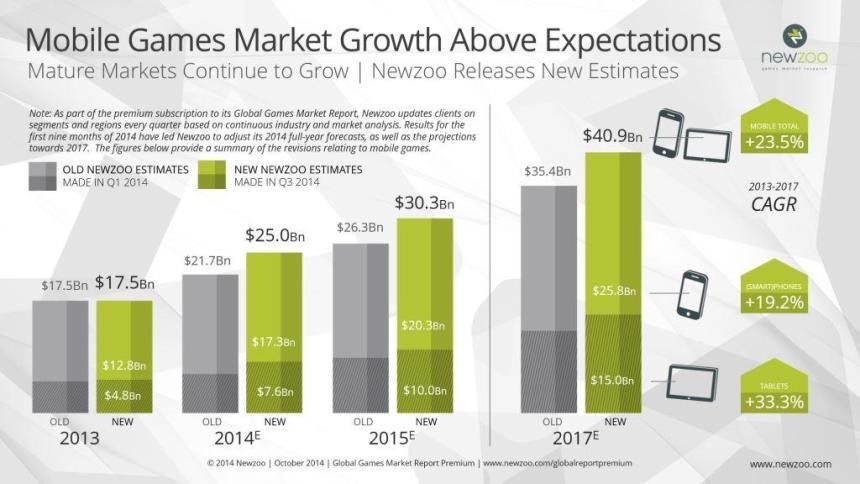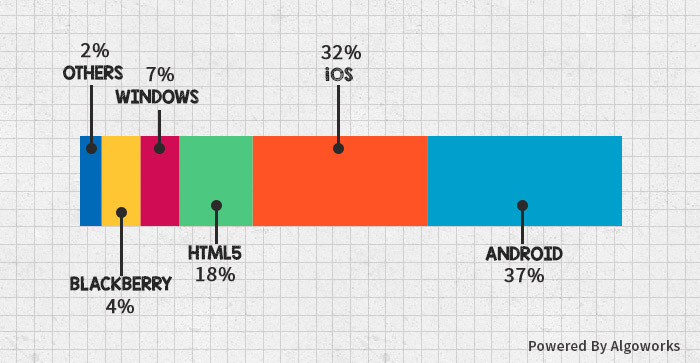The versatility and ubiquity of HTML5 has resulted in pretty many developers from around the globe pick up the language and develop games out of it. HTML5 is no more the ‘new’ thing in town and has rather quickly established its name in the technological ecosystem regardless of the scale of the industry. Whether it is your PC, your phone or your slate device, HTML5 is showing its wonders. I won’t hesitate in saying that it could even be there on your kitchen appliances 🙂
As it is being quickly adopted by one and all, it has been successfully replacing Flash and is emerging as a robust and a deserving alternative.
And that is beautiful.
In this blog we will talk about the impact of HTML5 in the world of Mobile Games Application Development. And just to confirm, this blog is the first of the many I am planning to write on HTML5 and Games Series. This journey into discussing about HTML5 and Gaming Industry has just begun and I ensure these series of blog will keep you hooked as it will be absolutely fresh and totally engaging!
Shift
You probably will be aware of the massive shifts that the gaming industry has gone through over the last few years. Zynga has revolutionized casual online games by using Flash while Native Applications on iOS and Android Rovio made sure innovation never took a breath. Even Unity has transfigured the way developers create games for pretty much all devices.
Such varied platforms have created great opportunities for games and in the past few years they have contributed a massive growth to this industry. But there was this one thing that bothered us all – ‘too many different technologies involved with a single platform’
There are many advantages of using HTML5 that I would like to summarize in a couple of lines so that I can quickly get to sharing the trends in the Gaming Zone. Of course we will take up each point in detail in my next blog.
HTML5’s compatibility on cross browsers & cross-platform, its remote update feature and how it is suited to the emerging markets are some salient features. The integration with frameworks such as SFS will also be picked up. We will discuss in detail why developers love using HTML5 and how development and debugging is lot simpler helping towards a developer-friendly environment.
HTML5 On Gaming Zone – Future Trends
Pundits, tech-groups and many researchers have given a thought that HTML5 by showing some dramatic impact will take a strong grip on Gaming Industry. HTML5 Game Development domain could replace Flash as the preeminent design platform in the space. HTML5 has now found a home in the gaming world and has outshone with an ability to work across all the platforms, which Flash has been unable to do. By successfully overcoming few challenges, HTML5 has become the talk of the town.
There are other signs that HTML5 is gaining steam. According to a recent report, 37 percent of Android apps could be implemented using HTML5 via a mobile browser, 49 percent via Phonegap, 63 percent via Appcelerator and 98 percent via Firefox OS.
To better understand the impact of HTML5 for Games, we must now study the Gaming Industry trends, its present scenario and obviously the sustainability in such a volatile technology market.
Let’s quickly go through this research done by Newzoo which talks about the Mobile Gaming Industry trends and growth from year 2013 to 2017.

You might not know this, but
The average cost of investing in mobile advertising is expected to rise up to $10 for native mobile apps next year.
This is not good. Plus it should be known that the big guns marketing it are not really able to translate it into success, be it in terms of installation numbers, download numbers or engagement. But how does HTML5 come into the picture here?
There was this idea to try build a very light version of games. The games usually are large in size. What if a trial or a demo version of the game was launched that gave enough for the users to get addicted to it? PuzzleSocial, a game development studio based in NYC, built a lite version of the game called “Daily Celebrity Crossword” on HTML5.
- The HTML5 game was distributed via mobile web
- The players could easily discover the lite game version via one of the mobile web distribution networks
- They could start playing it right from a mobile web browser
- Without needing to install an app!
- An HTML5 based lite version of a game meant ‘limited game play with a few levels’
- It was made available for free
As a result 320,000 unique game plays were registered in a span of 4 months. Yes, this thing actually worked! Users could follow the link to download the full game version from the app store, which was shown to them at the game over.
Launching an HTML5 Lite version was simple, pocket-friendly and quick. And now it all made a lot of sense because not only was it a hit in terms of popularity but also in terms of business investment.
It’s a different matter than only 10% of these users actually downloaded the full version. Though it was much more significant than the previous absolute number in the given period of time.
Let us also see, how many HTML5 apps are popular on device-specific platform:

So, HTML5 is here to stay. It is backed by the community, glorified by device and friendly to the browsers. Working with latest technologies is always fun and with the rapidly changing and growing mobile market, Algoworks Technologies is taking a big leap in the volatile market.
The story of HTML5 itself has been crazy so far. When it came, it seemed promising. When it came to actual implementation, it failed to compete with the native apps. And most recently, the launch of tools such as Xamarin, PhoneGap, Cordova, MonoTouch and others assisted in HTML5’s cause and the idea came back into the market. As of today, it has been realized that it is the requirement-type which drives this choice between native vs cross platform. But given its abilities and style, HTML5 has managed to develop a strong foothold in the Gaming Industry by giving the developers the right reasons to write code, businesses the right business to invest in, and users the addictive games to keep them busy!
There is a lot to talk about such as choosing game engines and frameworks, best practices to plan HTML5 games, distribution platform for HTML5 and defining various direct or 3rd party tools and elements you can inculcate in your mobile app development process while creating games! All this and more on HTML5 Game Development to be continued….
References:
http://todaysweb.net/hot-mobile-game-dev-industry-trends-2015/
http://www.awwwards.com/current-state-and-the-future-of-html5-games.html
http://bit.ly/1r35ojs
http://bit.ly/1xBjpLP
http://bit.ly/1M3nJd1












